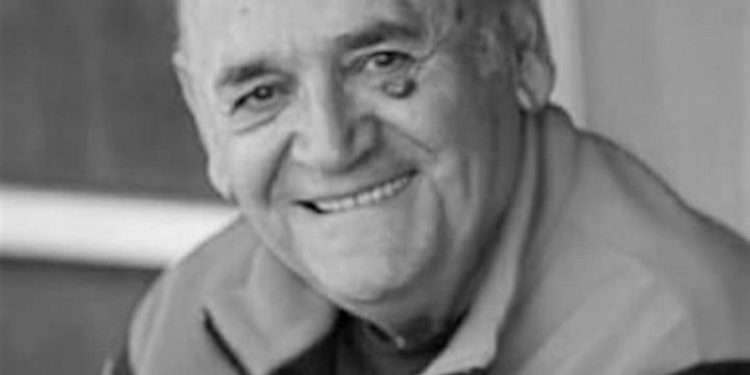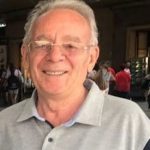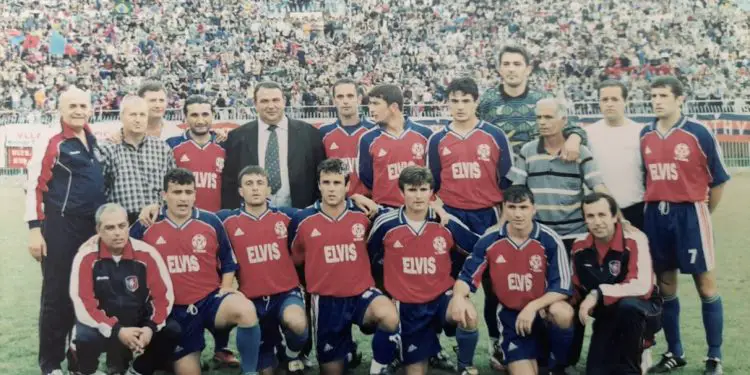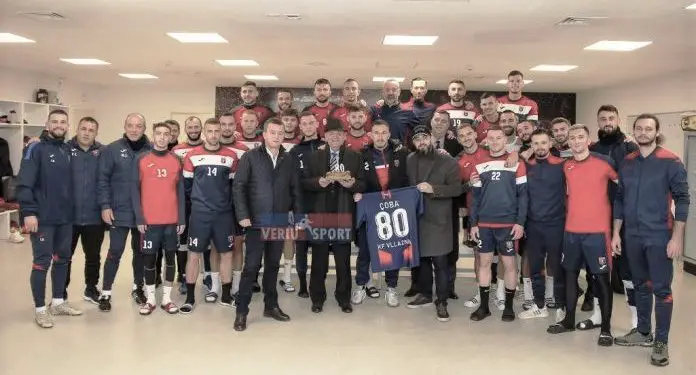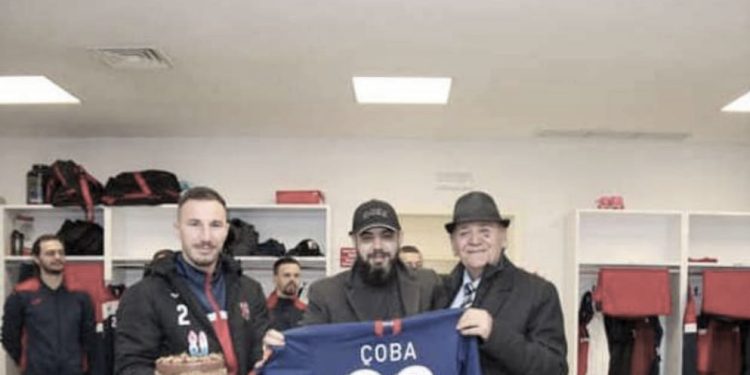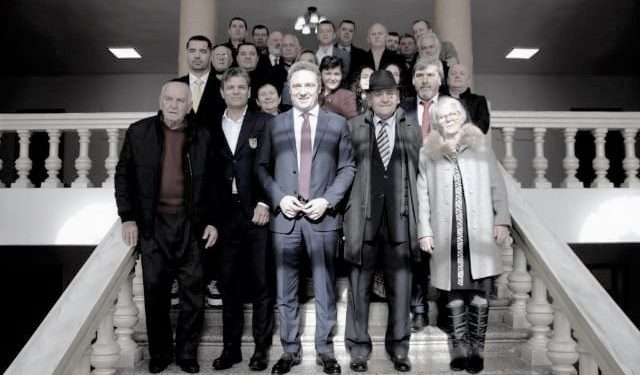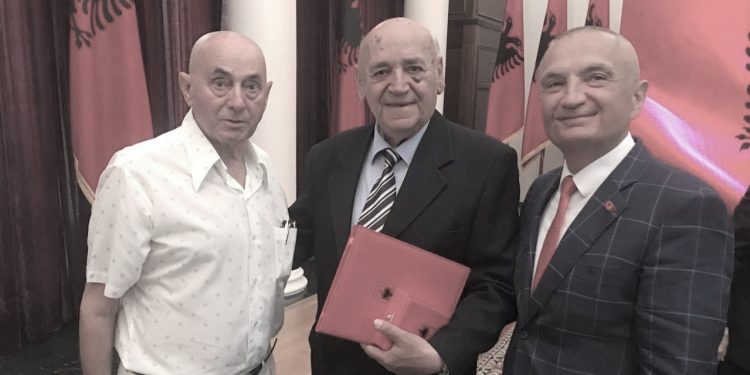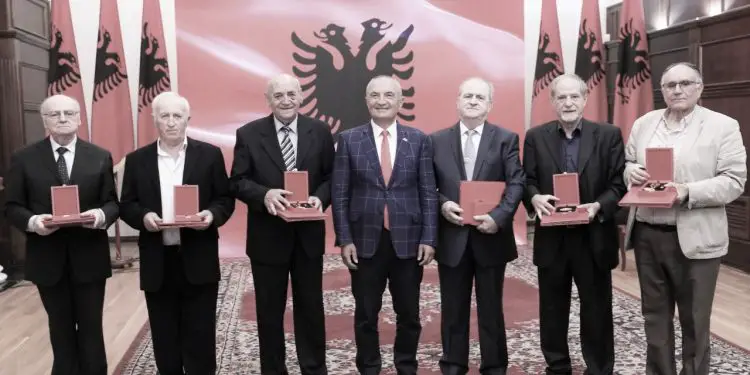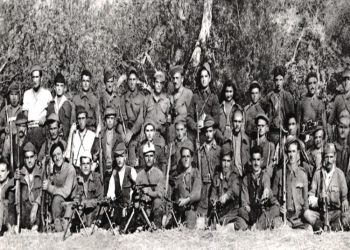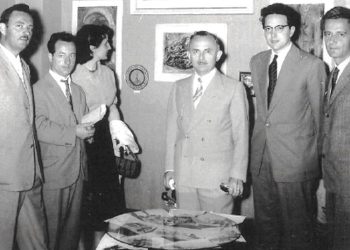By Namik Mehmeti
Memorie.al / In Shkodër, in one of the oldest neighborhoods of the northern city, “Banja Vogël”, the Çobaj house still attracts the attention of passers-by, as it has preserved its characteristic centuries-old architecture intact, starting from the wooden door with two huge lids, with latches and latches, to the garden with fruit trees. They inherited the passion for the sport of hunting, generation after generation, until Esati, who hung the couple as a relic. But one of the Çoba families, Teufik Çoba, played football with “Spartak” of Shkodra in the 50s.
And from this family, Zyhdiu abandoned the tradition of the sport of hunting, which in the banks of the “28 Nentori” gymnasium preferred the sport of basketball, making a successful career. Zyhdiu was so closely connected with the sport of his beloved team “Vllaznia”, and this probably forgives his profession as a doctor.
Today Dr. Çoba, known not only in Shkodër, but throughout Albania, has crossed the 80s and remains federated in “Vllaznia” as an inspiring emblem not only for his retired colleagues, but for all generations of athletes from Shkodra. This is a unique case, that a man from 80 years of life, 60 has forgiven the sport.
And I start the day with “Vllaznina” and end the evening with “Vllaznina”. He has experienced different moments with “Vllaznina”, as a basketball player and as a doctor, with many moments of joy and triumph, but also disappointments up to persecutions, just like the sportsmen condemned by the communist dictatorship, although his biography was spotless. In this leap of years, i.e. in the framework of the third age, we met in Shkodër and developed with Dr. Zyhdi Çoba this interview.
Doctor Çoba, sometime in an interview on the eve of your 80th anniversary celebration, when you were asked how you got to this age, you gave an epic answer; “I don’t know either.” What do you mean by this answer?
Nothing more than sports made me forget the years, even though they weighed on my shoulders.
You took the first step towards sports in high school, why did you choose basketball, when many of your peers preferred athletics, football, volleyball, gymnastics, etc.
I remember that in front of the gymnasium building, there was a sports complex with a basketball court, a volleyball court, and even an athletic track, while behind the gymnasium building; there was the “Spartak” sports corner. After classes, we would stop and follow the training of the “Vllaznia” team, where our physical education professor, Esat Haxhi, was also the coach of “Vllaznia”.
A group of friends approached the youth team and participated in the championship that took place in Elbasan, in 1959, making a dignified presentation together with Valter Kalan, Halit Shpuza, etc., taking second place. And after a year, me and Valteri, lined up with the first team of “Vllaznia”.
And the sports career in basketball previously with “Vllaznina”, one time national champion (year 1976) and two times winner of the Cup of Albania (years 1956 and 1957) as well as five years with the “Studenti” team (1961-1966) preceded your journey of six decades in sports, before devoting yourself to sports medicine?
Of course, in the years of study, in addition to basketball, I devoted myself to medicine, where I dreamed that one day I would be a sports doctor, so I would not be separated from sports so easily.
In Shkodër, in the “Spartak” sports corner, when the first five of “Vllaznia” lined up with the Meritorious Masters, such as: Luan Shatku, Renato Radoja, Vehbi Ademi, Skënder Osmani, the youngest among them, Zyhdi Çoba was chosen as team captain. Is this a preference of Coach Esat Haxhi, or an agreement among the team?
To tell the truth, when coach Haxhi, I trust him with this role, I took it hard, since all those names you mentioned were not only my inspirations, but also a coach in the youth team, where I started playing basketball. Prof. Esati, in order not to create dissatisfaction, if he singled out one of these names, called me and told me that; we can keep the team together, you being the team captain, as you have very good relations with everyone, regardless of age. Indeed, what affected the success of the team was the harmony we had, where humor was an integral part of daily communication.
The story of a ‘Gold Medal’, when the basketball player Çoba was no more than 20 years old?
It was the World Youth Festival, which took place in Helsinki, Finland. Albania was represented with a basketball team. Well-known names of Albanian basketball were selected, such as Renato Radoja, Vaso Shaka, Bujar Shehu, Muhamet Përmeti, Kostandin Papa, F. Qirici, Aagim Lahi, etc. I was the youngest in this team, where the opponents were teams from several countries known in the sport of basketball. Among many other relics, I keep this medal even today, it is special to me.
What do these relics represent, where you always present them in your interviews?
I was given the opportunity to go to international activities, not only as a basketball player, but also as a sports doctor, accompanying not only “Vllaznina” but also the national team, the national team of Hope, etc. The flags that the captains of the teams exchanged, that is, those of the opposing teams, I have selected and exhibited in the medicine cabinet, recently located in the premises of the “Loro Boriçi” stadium. Without a doubt and with dozens of photos, the special one is the one taken in Turkey, where our national team played in 1970, in the presence of the German coach Helmut Sheen, Loro Boric and the Turkish coach.
I remember your name in the articles that were published in the newspaper “Sporti Popullor” and “Sporti Shqiptar”, it was also mentioned for the passionate work you did in the “Vllaznia” club, in addition to being a sportsman, also with the establishment of the first sports medicine cabinet in Albania?
When I started my duty as a doctor in my city, it was an assessment for me to be in the position of inspector and later, in that of the deputy chief of health at the former District Executive Committee. But my dream was to contribute to sports medicine, which gave me the opportunity to specialize in traumatology. For 10 years I worked for free, I registered 1460 athletes, of all ages, in 110 “Vlaznia” teams, active in 20 sports.
Before each sports season, blood tests and heart diagnostics were done. Later, with the decision of the Ministry of Health and the State Sports Committee, the first sports cabinets were created in the seven main sports clubs of the country. With great respect, I remember the help given by Minella Kapo, as the main specialist in sports medicine, in our country.
In six decades of life inseparable from sports, in addition to those relics that you have archived, somewhere in your blocks, are there numbers and statistics?
I mentioned before, it is not to be forgotten that register with 1460 sportsmen’s names, a whole army of talents who represented “Vlaznia” and Albania, in the World Championships, in the World Olympics, European and Balkan championships, champions and record holders in many sports and not by chance, there are dozens and dozens of “Sports Masters” and “Deserved Sports Masters”, who have emerged from the bosom of 110 sports teams. To take on, to mention the names of these sports elite, who have left a mark and continue to leave a mark, requires several newspaper pages, without forgetting the responsibility that it belongs to a name that can be forgotten.
Surely you will not leave without mentioning the cooperation and very correct relations with the coaches?
Without discussion. I am sitting on the dock of “Vllaznia”, with 170 coaches and assistant coaches, not only from Shkodra, but also from the capital and districts of Albania, even from Montenegro and Germany. The relationships with them are unforgettable, such as Xhevdet Shaqiri, Rifat Rusi, Xelal Juka, Ramazan Rragami, Din Zhega, Astrit Hafizi, Sabah Bizi, Astrit Bushati, Ser Dedja, Esat Rakiqi, Ferid Borshi, Edi Martini, Skënder Jareci, Vasil Bici, etc., not forgetting foreign coaches, such as; Dervish Haxhiosmanovic from Montenegro, or the German-Croatian, Brardic. If I were to be asked which one I could prefer more, I would make a mistake, as I have created sincere working relationships with all of them and after the victories and defeats, there was no shortage of humorous jokes.
Dr. Çoba, your work has been spread over two periods, each of 30 years, like the one in the years of the communist dictatorship and the one in the years of democracy. It is difficult to determine where “Vllaznia” felt better, and your daily work itself?
I can’t put all that sacrifice behind me, I can sweat that the athletes from Shkodra, without a doubt, as I highlighted the successes, but when you think and remember the persecution that happened to the oldest sports club in Albania, “Vllaznia”, and its talented athletes, you feel a pain even today, when the names of the athletes who would represent “Vllaznia” were read, in the European Cups, or friendly matches and Paulin Ndoja, Frederik Çapa liku, Hajrullah Lekaj, Faslli Fakaj, Marin Shestani, Sokol Kalaj, Nikolin Pali, etc., were left out of the list. Or those moments of sadness, when the two most respected names of the basketball team, Filip Guraziu and Luan Shatku, were suspended for biography reasons. How I remember it today, how the lips of Prof. trembled. Esat Haxhi, the coach of “Vllaznia”, communicated the decisions of the party’s committee to leave their sport.
Why is “Vllaznia” always targeted, when even a doctor like your work was involved in this class war?
The punishments of “Vllaznia” came in many directions, where at one time even the “wet and dry” was burned, as a saying of the people says. It was even used in reprisals, such as the incident with the escape of two football players, Arvit Hoxha and Lul Bershemi, in 1986, when “Vllaznia”, returning from Finland, wanted to spend a night in Athens. About this event, it was also written by you. The measures that were taken were drastic. Meeting after meeting, accountability and together with the coaches, Hafizi e Rakiqi and Ferit Rragami, I was also sentenced to six months, taking the streets of Dukagjin to Pult.
But also the leaders of the delegation, such as Bahri Axhemi, an exemplary leader of sports in Shkodër, the companion of the Interior Department, etc., were suspended from their jobs. The most tragic was the event in Kosovo in 1971, when after the tournament of the “Vllaznia” volleyball team, for some gifts they had received from close and well-known people, not only the volleyball team, but all the “Vllaznia” teams were punished, where the most painful was not participating in the “Vllaznia” European Cups, for two years, and likewise all the teams of the Multi-Sports Club.
And how did the events flow for you as a doctor after returning from Finland?
At Pult, I would deal with health problems. There were conditions of scarcity in every direction in the life of the people of Dukagina. I started all over again. The Health Center had to be set up. The chairman of the agricultural cooperative, the people’s council, was also engaged. I was helped by my colleagues in Shkodër and up to the Ministry of Health. And a mini-pharmacy, so that the villagers did not need to take the road to Shkodra, for a package of aspirin. Its inauguration surprised the local government bodies and those of the Ministry, as they saw a model investment without much expense.
So the return to “Vllaznia” no longer had any barricades?
The term of the sentence had also been fulfilled. I would continue my work, in the further improvement of the sports cabinet, which also became a model example, at the Republic level. But the “evil eye”, as the people say, brought out some shadow and cloth in the biography. In 1988, Vllaznia would play for the Balkan Cup in Romania. To the surprise of everyone in the team, my visa was refused. The intervention of Tefta Cami, the Minister of Education, which also covered sports, not only did I not discuss getting the visa, but I also learned the reason for the refusal of the visa, a bit funny, that an Aja girl had an Ulcinian as her husband.
Dr. Çoba, in a brilliant article, from the historical and statistical point of view, by our colleague, the well-known journalist Besnik Dizdari, mentions the fact that “Vllaznia” has been punished 9 times by the dictatorial state of Enver Hoxha and UEFA, for not participating in the European Cups. Which of these punishments has remained a hostage to you?
All the punishments have had their own special effects, but those received by the Party have left a bitter taste, as they resembled the trials of a dictatorship. But when you remember the dignified presentation of “Vllaznia” in the Champions Cup with “Austria” in Vienna in 1986, where we won 2-0 in Shkodër and lost the qualification for the next round, only for a goal difference, (after losing 1-4 in the return match), not much has been written about that victory, where six “Austria” footballers came after a dignified representation in the World Cup that year.
Let’s go back a few years later, that is, when sports in general and football in particular, were freed from the grip of the communist dictatorship, i.e. Europe, we were closer and without any more punishments and persecutions?
We found ourselves facing an unrestrained exodus, as in all sectors of life. In response to the invitation of the French club “Ajacio” where the well-known footballer of “Vllaznia” of the national team, Hysen Zmijani, played, after two friendly matches, the team returned to Shkodër with 4-5 people, so coach Rakiqi had to complete the team, with the youth team, to continue the national championship matches. All sports felt this exodus, and moreover sports would be included in the market economy, the football team would emerge from the multi-sports club “Vllaznia”.
A race would begin to elect the presidents of the Club, since with state funding; even the preparatory phase could not be afforded. Don’t wait, “Vllaznia”, with the President of that time, the late Myftar Çela, a powerful businessman, would find the right way to confirm a professional football, where coaches and football players from Europe and the clubs of our country approached. After Myftari, with the same dedication, other businessmen such as Valter Fusha, Agron Çela, with the cooperation of the group, Xhevdet Amuli, Paulin Radovan, etc., continued to lead Vllaznina. But “Vllaznia” went through the biggest crisis in the years when it was led by a group of councilors from the Municipality, which also brought about the fall from the superior category. Many problems were created with the replacement of coaches and the lack of quality football players.
With the privatization of the football club by the President, Mr. Alban Xhaferi, he showed a commitment and will in building the technical staff, where the arrival of the coach, the German-Croatian Th. Brdaric and the implementation of an efficient marketing, brought a rapid transformation of the atmosphere within the team, the trust and responsibility towards the footballers increased and the enthusiasm of the sports fans approached once again. The very fact of winning two Albanian Cups, 1991 and 1992, runners-up only on goal difference with “Teuta”, participation in the European Cups, showed that the investment of the President Mr. Xhaferi was opening a new horizon for “Vllaznina” and I have the unwavering belief that the path he has started will realize the long-term projects.
Çoba, a football confrontation not only in “Vllaznia”, but in all the country’s clubs, three decades with political leaders and three decades with the President, who invest in Albanian sports. How did you experience these confrontations at “Vllaznia”?
During the years of the dictatorship, sports, especially football, were the only entertainment and pleasure for all ages. Despite, as I said above, the exaggerated punishments that have been given to the Club, “Vllaznia”, in all sports, there is a political leader behind him, like the late Shyqyri Rrjolli, who has helped and solved many problems of football players, such as in the placement at work, in the registration at the “Luigj Gurakuqi” University, in their housing, etc. It is also undeniable, the work of sports leaders in those years of class war, such as Bahri Axhem, Fahri Fan, Rifat Uruçi, etc., or the secretaries of the “Vllaznia” Club, such as A. Medja, Selami Dani, Taip Piraniqi, Ismet Hoxha, Mehdi Milla, Kujtim Shaba, etc.
A year ago, you were in the focus of the written and radio-television media, after you celebrated your 80th birthday. Did you think at the moment that a handover of the baton was due?
I had thought about such a thing, but when I talked with President Xhaferi, he wished me a happy birthday and said: “The reward that can bring you closer is the lifetime contract with the Club “Vllaznia”. And besides the thanks I gave him, I answered him with humor, after this gratitude and respect; I told him that; even if you retire me for the second time, I would come here again to my second home, “Vllaznia”.
I was present, as an undivided part of the technical staff, amidst the joy of the team and sports fans, for whom I have a lot of respect, as they were the 12th player for “Vllaznina”, when we selected seven championship titles, eight Albanian Cups, of course from 1972 onwards. For this, I thank all the trainers, specialists, officials and football players of all generations, who trusted and appreciated my contribution.
And for that, aren’t there a few awards that were given in this 80th anniversary?
I felt a lot of emotions on this occasion, from the “Grand Master” award, from the former President Mr. Ilir Meta, the “Gratitude of the City” given by the former mayor of my city, Mr. Bardh Spahija, from “Pllakati”, awarded by the President of the AFL, Mr. Armand Duka, and the symbolic jersey of “Vllaznia”, with number 80.
As you confess, Dr. Çoba, I understand that you are indebted to your wife, colleague in the profession, Dr. Kudreti, your two daughters, when even on Sundays, when the national championship matches were held, you would return at night, from Gjirokastra or Korça?
Without the support, understanding and sacrifice of my wife and the two daughters they are raising, my beloved nieces and nephews, there would be no question in my journey of several decades, in the field of sports medicine, in the successful crowning of my career as a basketball player and all that contribution, along with the football team and other teams of “Vllaznia”, where they have given me indelible memories even though sports, everywhere and in my city, have also had disappointments , but with the strength and brotherhood we had among each other, we came out with dignity and pride in front of the citizens of Shkodran. Memorie.al




